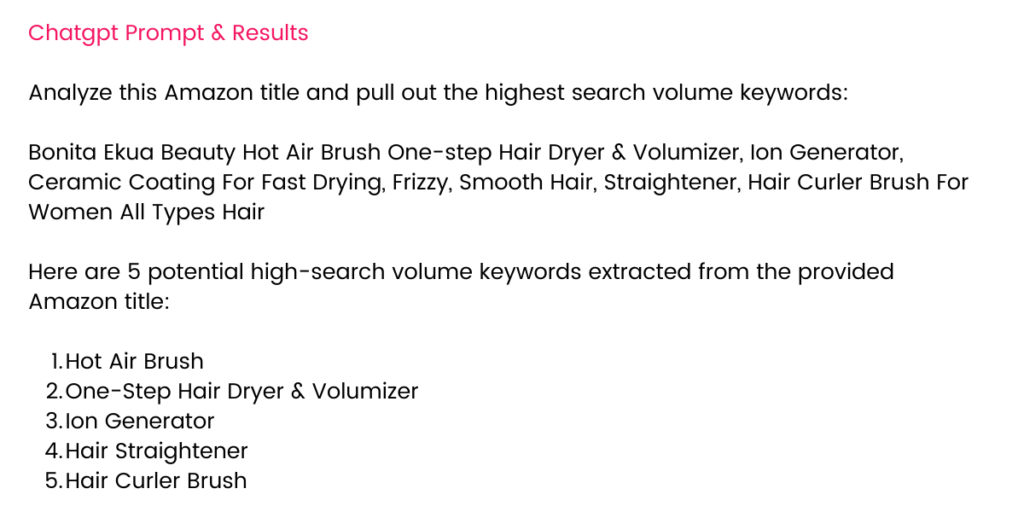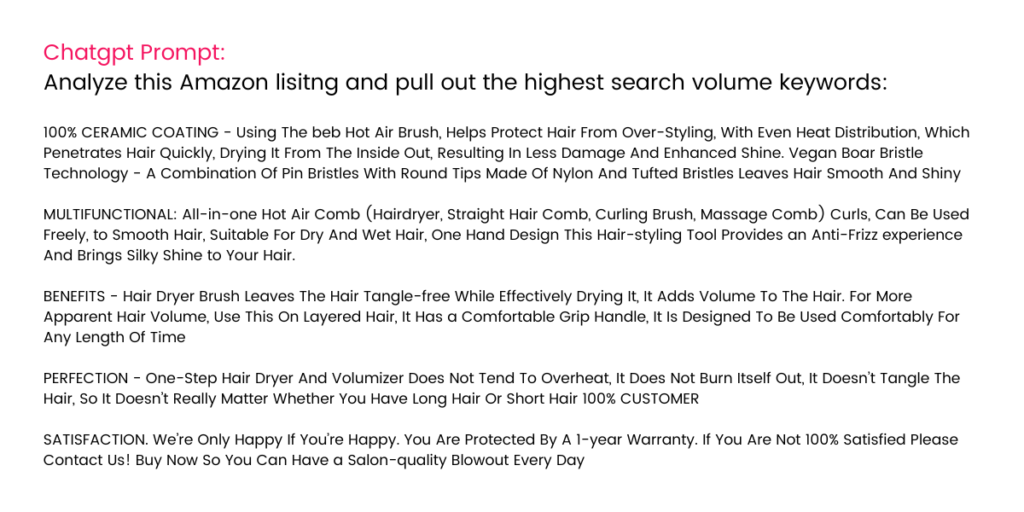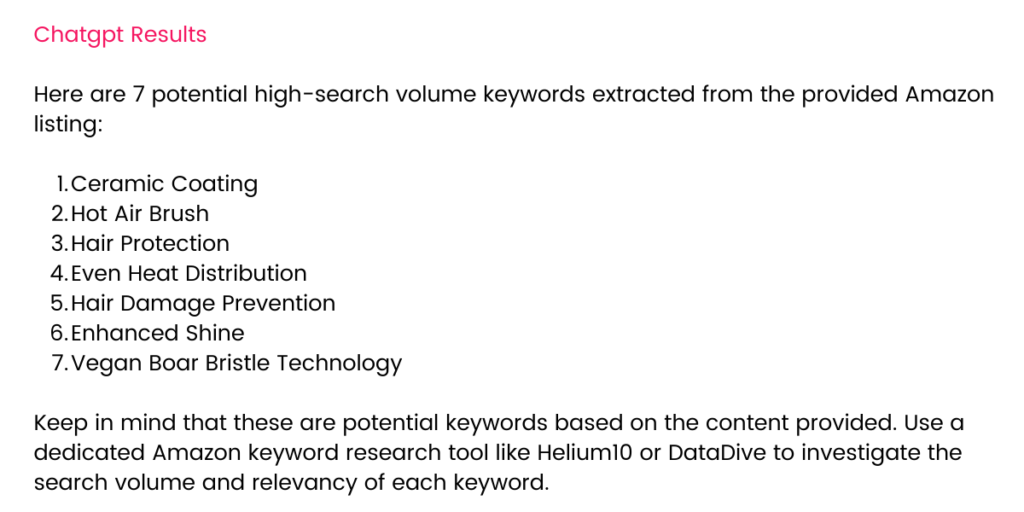The role of Artificial Intelligence (AI) has emerged as a game-changing force in Amazon keyword research, reshaping the strategies of Amazon FBA sellers and agencies in 2023. AI’s integration into Amazon FBA keyword research has propelled the process beyond conventional limitations, enabling sellers to achieve unprecedented levels of precision, relevance, and competitive advantage.
AI technologies, such as advanced language models like ChatGPT, have transcended basic automation and are now powerful tools that can decipher the intricate nuances of consumer behavior, search patterns, and evolving market trends.
AI’s ability to unravel insights, predict trends, and optimize strategies makes it an essential asset for those aiming to not only survive but thrive in the competitive Amazon marketplace. The convergence of AI’s analytical prowess with human creativity is the defining hallmark of this new era of Amazon FBA keyword research. Let’s explore how you can leverage AI in your Amazon keyword research strategy.
How Can AI Help Your Amazon Keyword Research Strategy?

Keywords remain the cornerstone of Amazon SEO and Amazon listing optimization. With competition increasing, targeting the right keywords can drastically impact your product’s visibility and sales. Amazon shoppers are becoming more specific in their searches, making long-tail keywords and semantic relevance critical.
AI models like ChatGPT can transform your Amazon keyword research by generating a wide array of relevant keywords, aiding in semantic analysis, and assisting in content optimization.
In the context of Amazon keyword research, AI’s capabilities are multifaceted:
Keyword Generation and Expansion
AI can generate a comprehensive Amazon keyword research strategy, from the broad to the ultra-specific, that caters to diverse user intents. This assists sellers in discovering hidden opportunities and tapping into long-tail keywords that could have otherwise remained unnoticed.
Semantic Analysis
AI excels in understanding the semantic relationships between words and phrases, helping sellers identify synonyms, related terms, and contextually relevant keywords. This semantic finesse ensures that products are surfaced in searches beyond exact keyword matches.
Competitor Insights
AI can analyze the content and keywords used by competitors’ product listings, unveiling strategies that lead to their success. This invaluable competitive intelligence aids sellers in refining their own keyword selection for enhanced discoverability.
Review and Q&A Content Mining
By scouring customer reviews, and Q&A sections, AI can uncover the language customers naturally use to describe products. This authentic language integration bolsters the alignment between product listings and customer expectations.
Algorithm Adaptation
The algorithms governing Amazon’s search and ranking mechanisms are in a constant state of evolution. AI equips sellers to swiftly adapt their keyword strategies to the Amazon A10 algorithmic changes, maintaining a competitive edge.
How To Leverage ChatGPT for Amazon Keyword Research: Step-By-Step Explainer

Using ChatGPT for keyword generation and expansion in the Amazon FBA marketplace can be a powerful approach to uncover new and relevant keywords. Here’s a detailed guide on how to leverage ChatGPT for this purpose:
Step 1: Define Your Amazon Root Keywords
Start by compiling a list of Amazon root keywords that are directly related to your product. These are the core terms that describe your product and its main features. You will expand on this list as your Amazon advertising strategy unfolds and more keywords prove relevant for your product.
Step 2: Craft a Detailed Prompt
When interacting with ChatGPT, provide a clear and detailed prompt. Include information about your product, its category, its uses, benefits, and any specific details that set it apart. You will leverage several prompts to unearth the best keywords.
Step 3: Generate Long-Tail Keywords
Ask ChatGPT to expand upon your seed keywords and generate long-tail variations. For example, if your seed keyword is “fitness tracker,” ask ChatGPT to generate longer, more specific phrases like “best fitness tracker for running” or “waterproof activity tracker.” Go to your desired Amazon marketplace and search these long-tail keywords in the search bar to ensure relevancy. Next, use Helium10 to unlock the search volume of each keyword. Relevancy is key to your success.
Step 4: Extract Synonyms and Related Terms
Use ChatGPT to identify synonyms and related terms for your seed keywords. Utilizing ChatGPT can help you identify synonyms, related terms, and variations. This improves your listing’s visibility for a broader range of search queries.
Step 5: Analyze Competitor Listings
Input URLs or descriptions of your competitors’ product listings. Ask ChatGPT to analyze the content and generate keywords that are being used effectively by your competition. Here’s the exact prompt to try:
Prompt #1
Analyze this Amazon title and pull out the highest search volume keywords. [Copy and paste your competitors’ title here.]

Fig 1.0: Example of an Amazon SEO title, and the resulting keyword scope using ChatGPT. Credit: Amazon.ca
Prompt #2
Analyze this Amazon listing and pull out the highest search volume keywords. [Copy and paste your competitors’ bullet points here.]

An example of an Amazon listing taken from the Amazon.ca marketplace. Copy and paste your competitor’s bullet with the correct ChatGPT prompt to complete this step. Credit: Amazon.ca.

Fig 1.1: Resulting search terms from ChatGPT.
Step 6: Explore User-Generated Content
Provide ChatGPT with examples of Amazon customer reviews and questions and answers from various Amazon listings that are related to your product.. (including your own if already live) Let it extract Amazon keywords and phrases that customers commonly use, giving you insights into their language and preferences. Helium10’s review insights tool helps create a perfect condensed format to view this information.
Step 7: Request Trending Keywords
Ask ChatGPT to generate Amazon keywords that are currently trending on Amazon in your niche. Provide context about your product and its category to get insights into emerging search trends. Specificity is important when prompting ChatGPT, and remember, you may need to try several prompts to garner the most relevant results.
Step 8: Group Keywords by Semantic Relevance
Once you have a list of AI-generated Amazon keywords, group them by semantic relevance. This helps you create content that covers a broader spectrum of user queries and improves your product’s discoverability. You’ll have to spend time researching relevance by searching keywords on Amazon to ensure they are as closely similar to your product as possible.
Step 9: Incorporate Amazon Keywords Organically
Integrate the AI-generated keywords into your Amazon product listing, including the title, bullet points, description, and backend search terms. Ensure that the keywords are seamlessly integrated for the Amazon A9 algorithm and humans.
Step 10: Leverage Chatgpt to Write Compelling Product Descriptions
Use ChatGPT to assist in creating persuasive and informative Amazon HTML descriptions that resonate with potential buyers. Incorporate the AI-generated keywords you found in the research phase so long as they are relevant.
Step 11: Iterate Your Amazon Keyword Research Strategy
Continuously monitor the performance of the Amazon keywords you’ve integrated. Keep track of which keywords are driving traffic and conversions. Based on this data, refine your Amazon keyword strategy over time for optimal results. Regularly test different sets of keywords and listing variations. Monitor performance metrics to identify what resonates best with customers.
By using ChatGPT to assist in your Amazon keyword strategy, you can uncover a wealth of relevant keywords that may have been otherwise overlooked. This approach allows you to tap into AI-driven creativity and analysis, resulting in a more comprehensive and effective keyword strategy for your Amazon FBA product listings.
Conclusion
The synergy between advanced Amazon keyword research and ChatGPT emerges as a beacon of innovation and empowerment for Amazon sellers around the globe. As the digital footprints of consumer behavior evolve, ChatGPT unfurls a spectrum of insights previously hidden in the depths of endless, unchartered data. Its ability to unearth nuanced user language and trends from Amazon reviews, and Q&As, across each Amazon marketplace offers a robust Amazon keyword research strategy unique in today’s Amazon selling landscape.
In a landscape where competition is the heartbeat and visibility the pulse, ChatGPT becomes the navigator, guiding Amazon FBA sellers through algorithmic intricacies. It analyzes competitors, deconstructs semantic nuances, and illuminates the path to strategic positioning with the luminosity of a guiding star.
ChatGPT empowers the art of persuasion by crafting narratives that compel and convince the discerning Amazon shopper. To the average Amazon FBA seller, ChatGPT is more than a tool; it’s a catalyst for transformation. It enriches keyword research, transcends conventional practices, and paves the way for sellers to paint their narratives on the canvas of digital commerce.
Elevate your Amazon listings with AI-powered technology by Christina Ink. Contact Christina Ink today for a free AI listing evaluation. Let’s maximize those sales!

LIKE THIS ARTICLE?